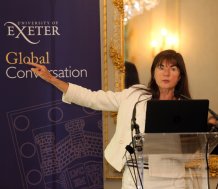
"It is important to explain in open debates like this the challenges and the possibilities for our quest to find Earth-twins."
The search for life beyond Earth
In June Exeter’s Global Conversation series visited Paris bringing together leading experts to discuss their work into the search for Earth-like exoplanets beyond our Solar System.
Is there life beyond Earth and if so how close are we to finding it? Some of the world’s leading astronomers and astrophysicists gathered in Paris to explore questions like these.
Exeter’s Professor Isabelle Baraffe, was joined by Professor Didier Queloz (University of Cambridge), who discovered the first exoplanet 20 years ago, to explore how their research partnership into exoplanets and Terra Hunting Experiments are teaching us more about our own planet, its history, and its future. Astrophysicist and research partner, Professor Nikolai Piskunov (Uppsala University) joined presenters on the panel to answer audience questions from Exeter’s alumni and supporters.
During the lively panel session, audience had the opportunity to ask a range of questions including: ‘Why can't we go to one of the exoplanets?’ To which, the panel answered ‘because we can't travel faster than the speed of light - a slight limitation!’
Another question from the audience: ‘Are the researchers still working on the same theory from twenty years ago, or does the theory change?’ The panel answered: ‘Over the last 10 years there have been huge advancements, with new fields emerging. The theory is catching up with the observations.’
To follow the full event coverage, please visit the Global Conversation Twitter feed @UoEGlobalConvo.
Professor Isabelle Baraffe reflected:
It is important to explain in open debates like this the challenges and the possibilities for our quest to find Earth-twins. It’s also important for non-scientists and some of the major influencers in our society to understand what needs to be developed in the future, both in terms of technology and of scientific models and theories.
Following two fascinating presentations and the engaging Q&A session, alumni guested enjoyed an update by Exeter’s Provost, Professor Janice Kay. During the cocktail reception, guests had the opportunity to enjoy an art exhibition on the theme of exoplanets by Pandora Mond, artist in residence at Exeter’s Astrophysics Department.
Professor Janice Kay outlined the importance of this public lecture series:
Global Conversation events are designed to show how Exeter, working in collaboration with its partners across the world, is having an impact on many of the global challenges and shared interests we face today. Our Global Conversation series is not only a window on what Exeter’s leading researchers do, it shows how they work with their international counterparts and policy-makers to investigate and address some of the most fundamental questions confronting all of us wherever we are located.
You can view images from this event by visiting the online photo gallery.
More on Global Conversation
Launched in March 2015 with two events in Hong Kong, the Global Conversation series explores how the University of Exeter, working in collaboration with its partners across the world, is having an impact on many of the shared global challenges we face. Events in the series focus on common issues and problems, from Climate Change to Dementia, and encourage conversation between experts in their fields, guests and a wider public audience. For more information visit the Global Conversation webpage.
Upcoming events
In November 2015, University of Exeter faculty will be visiting North America to participate in further Global Conversations, answering questions on topics surrounding the environment, health and disadvantage. Events will take place in Toronto, Canada (9 November 2015), New York, USA (12 November 2015) and San Francisco, USA (16 November 2015), please see individual event listings for more details.
Date: 28 July 2015
